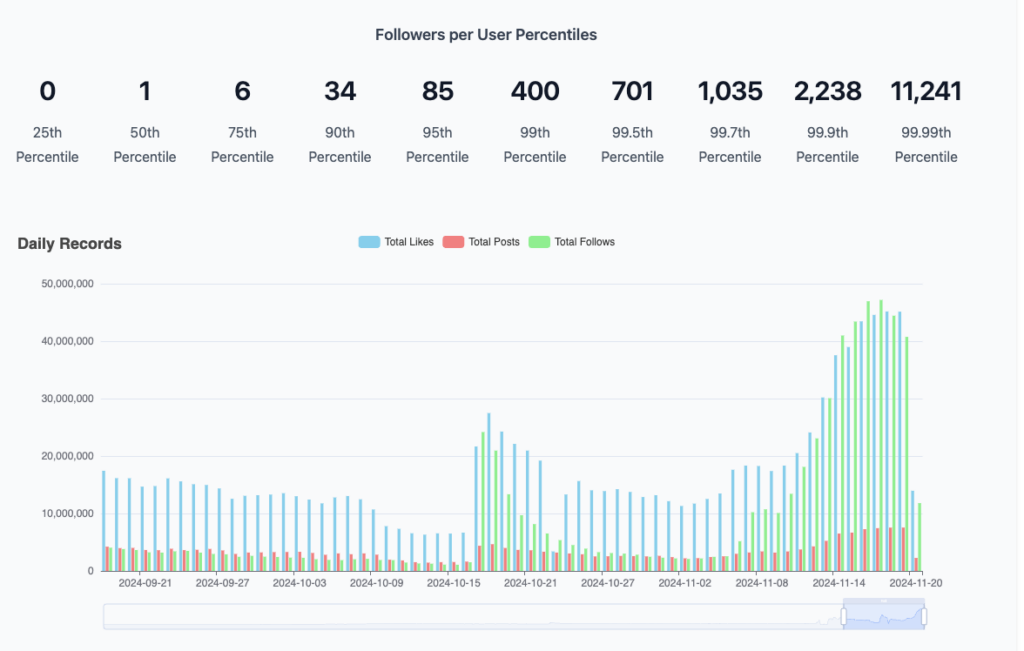Accounts and traffic on social media platform Bluesky are soaring, in part as people react to the collaborationist politics of X’s owner, in part due to the toxic nature of a platform fueled by hate and divisiveness.
I have thoughts that don’t quite add up.
I left Twitter (back when it still was) in the run-up to the 2020 U.S. elections. Something about it felt unrewarding and sick-making, even as I scrolled mostly within a bubble of people with similar values and beliefs to mine. I joined Bluesky in February 2024 “just to see.” My follow count grew by 100% in the past week. I now have six followers, up from three! (Follow me if you’re interested)

I.
Some of it reminds me of the Clubhouse surge. “Everyone” wanted to get on the platform, turned various tricks to get an invite, and within really just a few weeks, people got tired of the yammering and mostly went away. Its monthly active numbers have dipped by 93% between its peak in June 2021 and April 2024 according to UX Collective. I have no idea what it’s like there now. It’s not clear whether all the new accounts on Bluesky add up to anything sustainable. Trends can be very fickle.
II.
It might not really be a good thing that anyone repelled by the political climate of the Musk-iverse just goes off into a separate bubble. The effect of filter bubbles on increasing polarization has been amply covered. Bluesky may just become another way for people to stop listening to each other.
III.
Part of the reason why Democrats lost is that the party took its eye of what was happening even in the most mainstream of alternative platforms, such as large-audience podcasts. Trump’s campaign doubled down on them, arguably winning over some persuadable voters if you look at the surprising gains they made with younger voters. I may have the luxury of protecting my dainty sensibilities by leaving, but there’s a case to be made for repeatedly exposing people to messaging. It sticks. Hiding from it isn’t an effective channel strategy for campaigns.
IV.
X may be struggling, but it does have a business model. So does Threads, a Meta-owned platform. Bluesky does not. The company doesn’t make money and seemingly has no plans to do so, but it does take VC money. It’s an open question whether it can operate in an alternative world forever or will eventually feel pressured by investors and the logic of capitalism to find a way to monetize.
V.
Like many users, I may be “on” Bluesky, but I have posted 12 times in nine months. How many new users will post sporadically and get bored or feel dissatisfied with the platform’s low-dopamine, low-reward nature?
VI.
The distribution of social capital on Bluesky is massively unequal. My 12 followers put me somewhere in the mid-80th percentile of follower counts. Over half of users have 2 followers or fewer.

Source: https://bsky.jazco.dev/stats
VII.
It’s unclear what will happen when X becomes a steady feed of radical right propaganda that reflects the actual government’s agenda. It’s unclear what role the additional variable of Truth Social will play. Do they merge or federate somehow? People may start coming back to hear at least a slight glimmer of the official version of things. After all, we are hearing about people “moving” to Bluesky, but there isn’t any data on how many people actually deleted their accounts on X, even if they’ve gone inactive for a while.
VIII.
Is it just a proxy for an unmet need or unfulfilled desire to repatriate? For U.S. emigrants, that could be the case.




